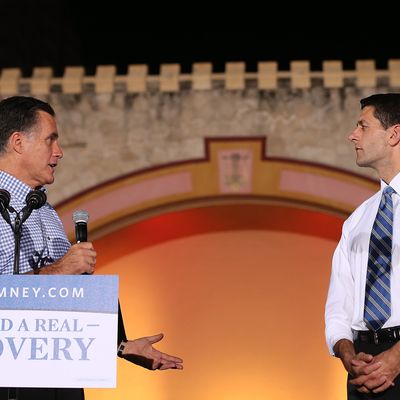
There are two sentences in the middle of Jonathan Martin’s story about Paul Ryan that perfectly reflect the fraud that is at the heart of Ryan’s political rise, and which now imperils him. Here is the telling passage:
>Ryan’s admirers say it’s unfair to suggest he’s merely a green eyeshade Republican. After all, his political mentor was supply-sider and congenital optimist Jack Kemp, and when Ryan bumped up against Romney’s high command during the campaign it was over the congressman’s desire to speak more to poor voters about how conservative policies could affect their lives.
The first thing you have to understand here is the redolent phrase “green eyeshade Republican.”
The first thing you have to understand here is the redolent phrase “green eyeshade Republican.”
Before Ronald Reagan, the Republican party used to be dedicated mainly to controlling deficits. The supply-siders transformed the party’s agenda into one focused monomaniacally on cutting tax rates, especially at the top. “Green eyeshade Republican” is a term of abuse applied by supply-siders against Republicans who believe that there needs to be some connection between how much the government spends and how much it takes in.
As I explained in my profile of him last year, Ryan rose through the party ranks as a fervent supply-sider. He began as a fervent disciple of Kemp, who was a fanatical believer in the economic power of marginal tax cuts, to such an extent that he believed the stronger economic growth these tax cuts would unleash could create enough revenue to provide more funding for social programs.
Few Republicans actually followed Kemp’s enthusiasms quite that far. But during the Bush era, Ryan came to be a spokesman for the House Republicans who stood to Bush’s right. Some critics have noted that Ryan supported Bush’s profligate agenda — the tax cuts, the massive military commitments, the prescription drug benefit, all financed through borrowing — but this understates the case. Ryan was the leader of the wing of Republicans demanding that Bush increase the deficit even more. He castigated Bush’s tax cuts as far too small. He sponsored a Social Security privatization scheme entailing more than a trillion dollars of borrowing, which the Bush administration rejected as “irresponsible.” Ryan assailed Republicans who expressed concerns about deficits:
“We noticed that the green-eyeshade, austerity wing of the party was afraid of class warfare,” Ryan said during Bush’s first term. “They fear increases in the debt, and they were overlooking issues of growth, opportunity, and free markets.”
Since the Obama era, Ryan has managed the difficult task of remaining true to his supply-side roots while also positioning himself and his party as advocates of smaller deficits. Some of this repositioning involved genuine policy changes. Unlike Kemp and Bush, Ryan has advocated massive cuts in Medicaid, children’s health insurance, food stamps, and other programs targeting the poorest and sickest Americans. He has tried to coat this policy mix with an optimistic sheen, arguing that cutting off these benefits will prod the poor to stop being lazy and dependent and launch them on a trajectory of upward mobility.
So now Ryan has to, essentially, un-re-brand himself. His supporters plead that he is not “merely” a green eyeshade Republican. Stripped of the euphemism, they’re saying, Paul Ryan isn’t merely an advocate of fiscal responsibility, he is also … the exact opposite of one.






























